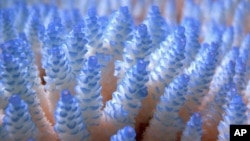Coral reefs are the rainforests of the sea, forming some of the most diverse ecosystems on Earth. The vast expanses of colorful rocklike structures are the exoskeletons of colonies of tiny marine creatures, and they are being destroyed by pollution, overfishing, warming seas — and, according to a new report, sunscreen.
John Fauth, a biology professor at the University of Central Florida in Orlando, said the culprit is a chemical in sunscreens called oxybenzone, which filters the sun’s ultraviolet light, and not much is needed to wreak havoc on coral.
“If you were wearing a bathing suit, say, and covering most of your body with sunscreen, then you jump into the water, the arc that you are contaminating is about the size of an Olympic-size swimming pool,” he said.
Fauth and his colleagues did toxicology studies looking at oxybenzone’s effect on the coral. He said it causes their exoskeletons to turn white, damages the adult creatures’ DNA and deforms coral at the larval stage because of genetic damage.
The findings were published in the journal Archives of Environmental Contamination and Toxicology.
Fauth, a diving enthusiast, studied the coral reefs in the U.S. Virgin Islands. He said people need only look at the surface of the water when they come out of the ocean to see the sunscreen that has washed off their bodies.
“Once all these visitors come out of the water, you’ll see a sheen on the water from the sunscreens that they leave behind," he said. "And when you multiply that times several hundreds [of] people in a small, enclosed area, that’s a recipe for trouble.”
The coral, according to Fauth, aren’t the only sea creatures affected by oxybenzone. "It degrades, and then all the other marine life that depend on that reef, including the fishes that we eat, they disappear," he said. "They don’t have homes anymore. The corals are the homebuilders.”
Fauth said older sunscreens, the kind that turn your nose white, appear to be safe around coral reefs.
He also recommended covering up with a long-sleeved cotton shirt or wearing a wetsuit, thereby skipping the sunscreen and protecting the tiny sea creatures that keep the oceans vibrant.












